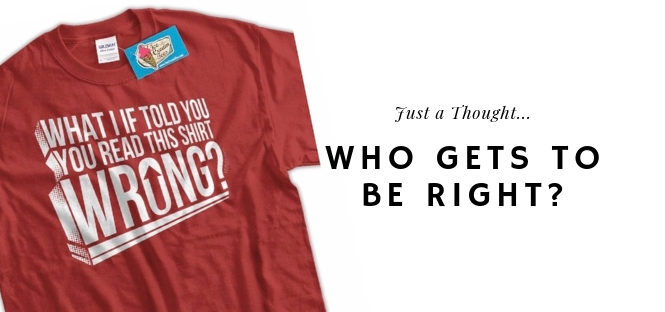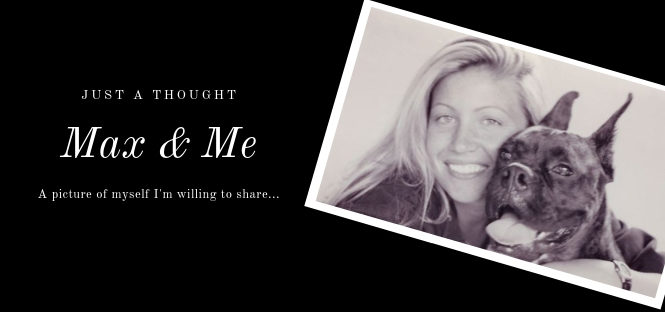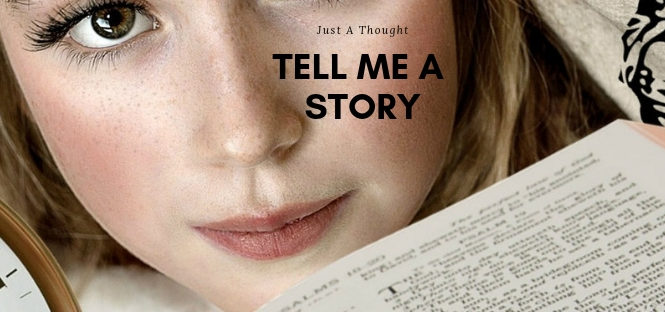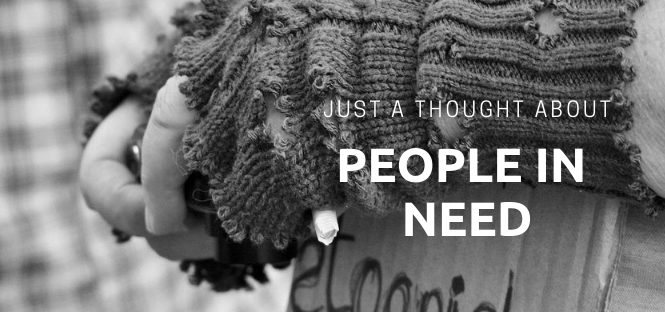I saw this T-shirt on my newsfeed:
What if I told you you read this shirt wrong?
It kind of summed up a frustration I’ve been trying to unpack for a week or so about how we treat each other these days. Sorry for getting wide in that statement and invoking the “royal we” instead of keeping this post more centered on my struggles with judgmental-ness and assumption. But for me, this post needs to wander out a bit into the culture I’m a part of, but can’t always understand.
Please allow me to organize my thoughts a bit here, and I’d like to seek some of that “preemptive empathy” I’ve written about in the past. I’m not interested in starting any fights or upsetting anyone by expressing the thoughts I just can’t keep inside of me anymore. I’m just unwinding a snarl or a snag, if you will, in my mind.
So here goes…
There’s this lady that I know — I guess I should say “I kind of know.” Let’s just say my life and her life have a direct connection, yet the connection is not personal. Anyway. This lady found herself in a pretty messy place of controversy, and it felt like there for a minute, everyone I knew was talking about it. She and her husband have recently become public figures in our tiny town of Sonoma, California, and with fame in a small city comes extra scrutiny, I suppose.
This lady posted something on social media that I’m fairly sure she never meant to go public. But it did. And in this part of the world, the statement she made was close to unforgivable. The next thing you know, there’s a lengthy article about it in our local paper, and there was even a small protest rally in our square about the specific issue she mentioned in her post. Whether she wanted to be in the mix or not, she was, and in a way, she was kind of at the center of it.
When I was a kid, my mom gave me some solid advice: Don’t talk about politics or religion in mixed company.
That was the rule of thumb back in the day. But nowadays, we have so many more places to “talk,” and people never seem to feel timid about “going there” like I do. In fact, people often act like it’s their duty to set the record straight — especially on social media — and to shame others when opinions don’t align. (I could say more about that, but I won’t!!) But the questions I struggle with the most are these:
Why is it OK to say one offensive thing, but another “decidedly” offensive thing is the one that comes with a heavy dose of public shame?
If it’s OK to have an opinion, than why do some opinions get trashed while other opinions get to stand?
When these types of clashes happen around me, that statement on that T-shirt seems so fitting. Even though we’re all reading the same words on the shirt, there are judgmental voices out there telling us that we’re reading them wrong? And if that’s the case, who is the arbiter of “right?”
[NERD ALERT] I listened to these two different podcasts recently, and they pushed these thoughts even deeper into my core. One podcast was about this girl who was trying to not be a “racist” in her Tinder dating selections. So she made up her mind to pick men outside of her “preferred race,” and then go have sex with these men to see if it would help her alter her “inner racist” dating habits.
The day before that, I listened to this heartbreaking story on a podcast about a girl who had been sex trafficked, and how emerging from a life of abuse had all but ruined her understanding of herself and what “safe intimacy” even looks like. The trust issues and self-loathing she was trying to overcome were pretty daunting, and I felt so troubled by the reality she has to face in her life at a fairly young age.
The juxtaposition of one girl’s life of sexual self-expression compared to another girl’s life experiences of being used and abused by a sexual predator was quite stunning to me. And to be brutally honest, it would be so easy for me to take a position on these two polarizing stories and bash one so I could further elevate the other. But everything about this world is so much more complex and nuanced…and messy.
I can’t possibly understand everything there is to understand in this world — and especially in my own culture because I can’t know all of the stories that influence people’s lives or shape their realities. It’s impossible. But I do know that we are so strong, yet so malleable as humans. And I do know that we are shaped and changed by our pain as much as we are shaped and changed by our environment. So even though I hope everyone has a like conviction that sex trafficking and abuse are inexcusably wrong, in the larger sense of things, I simply can’t come up with a way to categorize all thoughts, all feelings, and all of the personal actions of others into two exclusive groups: RIGHT or WRONG.
And maybe that’s exactly what has drawn me to that T-shirt.
Instead of the shirt accusing the reader of being on the wrong side of an argument or issue, it’s really more of a reminder that there is always more to every story. And what you see in something might not be enough to stand on.




